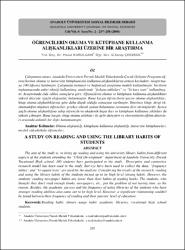Öğrencilerin Okuma Ve Kütüphane Kullanma Alışkanlıkları Üzerine Bir Araştırma
Özet
Çalışmanın amacı, Anadolu Üniversitesi Porsuk Meslek Yüksekokulu Çocuk Gelişimi Programı öğrencilerinin okuma ve üniversite kütüphanesini kullanma alışkanlıklarını ortaya koymaktır. Araştırmaya 100 öğrenci katılmıştır. Çalışmada betimsel ve bağıntısal araştırma modeli kullanılmıştır. Verilerin toplanmasında anket tekniği kullanılmış, analizinde “frekans tabloları” ve “ki-kare testi” kullanılmıştır. Araştırmada elde edilen sonuçlara göre; örgencilerin okuma ve kütüphane kullanma alışkanlıkları yüksek düzeyde (güçlü alışkanlık) bulunmuştur. Buna karsın örgencilerin gazete okuma alışkanlıkları, kitap okuma alışkanlıklarına göre daha düşük olduğu sonucuna varılmıştır. Yeterince kitap, dergi vb. okumadığını düşünen örgenciler, gerekçe olarak zaman bulamama sorununu ileri sürmüşlerdir. Ayrıca güçlü okuma alışkanlığına sahip öğrencilerin akademik başarıları ve kütüphane kullanma sıklıkları da yüksek çıkmıştır. Buna karsın, kitap okuma sıklıkları ile gelir düzeyleri ve ebeveynlerin eğitim düzeyleri arasında anlamlı bir ilişki bulunmamıştır. The aim of the study is; to bring up reading and using the university library habits from different aspects of the students attending the “Child Development” department of Anadolu University, Porsuk Vocational High school. 100 students have participated in the study. Descriptive and connective research model has been used in the study. Surveys have been used to collect the data, “frequency tables” and “ki-square tests” are used for the analysis. Considering the results of the research, reading and using the library habits of the students turned up to be high level (strong habit). However, the students’ reading newspaper habits are lower than their habits of reading books. The students, who thought they don’t read enough books, newspapers, etc., put the problem of not having time, as the reason. Besides, the academic success and the frequency of using libraries of the students who have stronger reading abilities also came out to be high level. However, a significant relationship couldn’t be found between their frequency of reading and their parents’ level of education.
Kaynak
Anadolu Üniversitesi Sosyal Bilimler DergisiBağlantı
https://hdl.handle.net/11421/329Koleksiyonlar
- Cilt.08 Sayı.2 [15]
- TR-Dizin İndeksli Yayınlar Koleksiyonu [3512]


















